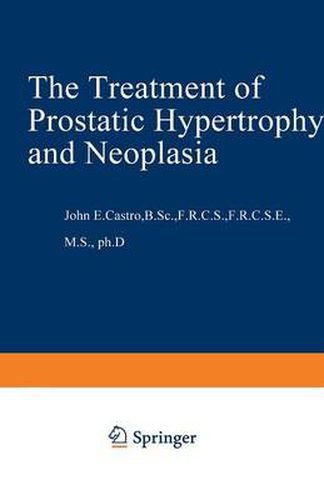Readings Newsletter
Become a Readings Member to make your shopping experience even easier.
Sign in or sign up for free!
You’re not far away from qualifying for FREE standard shipping within Australia
You’ve qualified for FREE standard shipping within Australia
The cart is loading…






This title is printed to order. This book may have been self-published. If so, we cannot guarantee the quality of the content. In the main most books will have gone through the editing process however some may not. We therefore suggest that you be aware of this before ordering this book. If in doubt check either the author or publisher’s details as we are unable to accept any returns unless they are faulty. Please contact us if you have any questions.
In 1963 Professor Huggins! wrote more than one half of the male population over the age of 50 suffer from benign tumors known as prostatic hypertrophy. Often an enlarged prostate is the only difficulty to cloud an otherwise tranquil old age . This statement emphasizes two important features of benign prostatic hypertrophy (BPH); the frequency with which it occurs and its association with increasing age. The true incidence is difficult to determine as most data relate to selected groups of patients; moreover, the diagnostic criteria of prostatic hypertrophy are not clearly defined. Normality merges imperceptibly into abnormality, for even in men who are clinically normal, rates of urinary flow decrease with 2 increasing age . Despite these inaccuracies, incidence figures show the magnitude of the problem; Flocks (1963) 3 reported that 65% of American men over 60 years suffer from it and in a selected group of Danish men 43% had symptoms of the 4 disease ; similar figures are reported for the U ni ted Kingdom 5. At present most patients with BPH, who need treatment, undergo surgical prostatectomy which may be considered the usual treatment. The frequency of the disease alone, creates certain problems, for annually more than 30000 men are admitted to hospital in the United States with this as a primary diagnosis and with an ageing population the figures can be expected to increase.
$9.00 standard shipping within Australia
FREE standard shipping within Australia for orders over $100.00
Express & International shipping calculated at checkout
This title is printed to order. This book may have been self-published. If so, we cannot guarantee the quality of the content. In the main most books will have gone through the editing process however some may not. We therefore suggest that you be aware of this before ordering this book. If in doubt check either the author or publisher’s details as we are unable to accept any returns unless they are faulty. Please contact us if you have any questions.
In 1963 Professor Huggins! wrote more than one half of the male population over the age of 50 suffer from benign tumors known as prostatic hypertrophy. Often an enlarged prostate is the only difficulty to cloud an otherwise tranquil old age . This statement emphasizes two important features of benign prostatic hypertrophy (BPH); the frequency with which it occurs and its association with increasing age. The true incidence is difficult to determine as most data relate to selected groups of patients; moreover, the diagnostic criteria of prostatic hypertrophy are not clearly defined. Normality merges imperceptibly into abnormality, for even in men who are clinically normal, rates of urinary flow decrease with 2 increasing age . Despite these inaccuracies, incidence figures show the magnitude of the problem; Flocks (1963) 3 reported that 65% of American men over 60 years suffer from it and in a selected group of Danish men 43% had symptoms of the 4 disease ; similar figures are reported for the U ni ted Kingdom 5. At present most patients with BPH, who need treatment, undergo surgical prostatectomy which may be considered the usual treatment. The frequency of the disease alone, creates certain problems, for annually more than 30000 men are admitted to hospital in the United States with this as a primary diagnosis and with an ageing population the figures can be expected to increase.